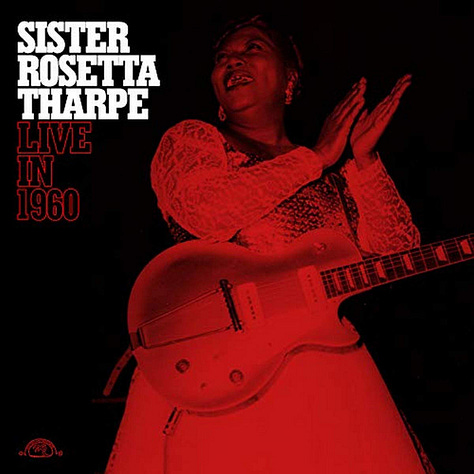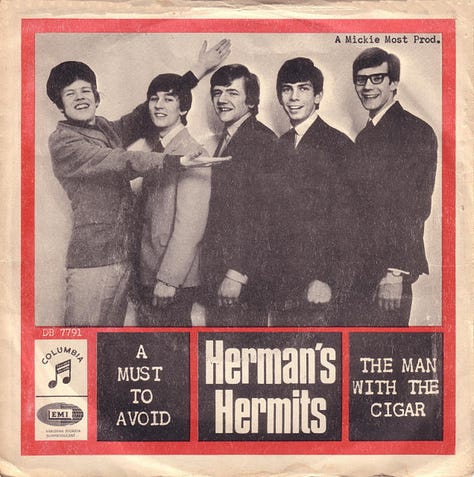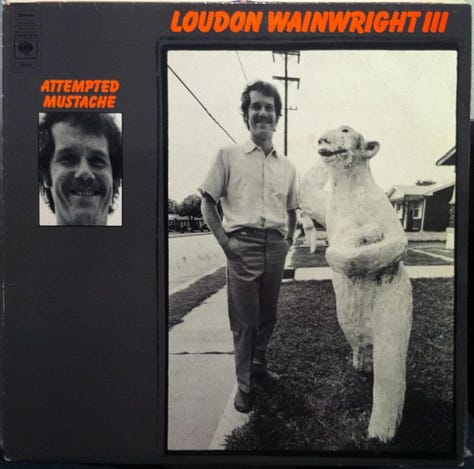Xgau Sez: May, 2025
On guitar: Sister Rosetta Tharpe, Bones check, the spiritual exhaustion of the Must to Avoid, quality albums never to be heard again, the excellence of the A minus, and Xgau on film.



Your article about Tiny Tim and Sly Stone turning their weddings into spectacles left out Sister Rosetta Tharpe, who staged her wedding to her manager in 1951 at Griffith Stadium Washington DC for 25,000 paying customers (according to Wikipedia). I also have a question: I have a three-CD set of her recordings that concentrates on her gospel singing. That’s ok as far as it goes, but do you know of a collection that focuses on her guitar playing? What videos I’ve been able to find are real knockouts. Thank you. — Paul Hardin, Dearborn, Michigan
I’ve written about plenty of gospel music over the years, but—call it the lapsed Christian in me—nowhere near as comprehensively as I have blues, where I’m not a completist either. I no longer recall how my Tharpe review came to pass, though it was only five years ago, but for sure there’s plenty of guitar on that album. Were I to make a project of it I’m sure I’d find more of her music I liked but not therefore music that demanded coverage or was right down my alley. Plus serious gospel delving would probably unbalance my music coverage in general. As for throwing herself a Griffith Stadium wedding, a story I don’t recall ever running across, I say good for her. For one thing, there’s no doubting the strength of her religious commitment as there is with Sly and Tiny.
Have you or Carola read John Lurie’s memoir, The History of Bones? Carola features in a very funny anecdote in Chapter 23. — Ryan S., Barrington, New Hampshire.
That one never came in the mail, although I do have some social connections to Lurie that to the best of my faltering recollection do not touch on Carola. If somebody were to send me a copy I promise I’d take a look at Chapter 1 after checking out Chapter 23. But not therefore to finish the thing. That would have to be on narrative merit alone, though for sure Lurie is a very smart guy.
Some of my favorite things you’ve ever written are negative reviews for albums I’ve never listened to and probably never will, often by artists about whom I have no knowledge or opinion. I don’t know why this is, but I think it has something to do with the way you convey your ideas about music you dislike—it helps me clarify why I dislike certain things, and thinking this way helps me understand and appreciate why I like what I like. I know you don’t write pans anymore and you’ve said you don’t miss it, which makes sense, But was there a point in your career when you felt like processing what you dislike helped you enjoy what you like? — Ben, Grand Rapids, Michigan
For quite a while I counteracted the Voice’s annual Thanksgiving things-to-be-thankful-for guff, which I found ickily liberal, by writing an annual all-pans November CG I dubbed the Turkey Shoot, plus for a while there every CG included one highly unrecommended album I dubbed the Must to Avoid, a label inspired by the Herman’s Hermits hit “(She’s) A Must to Avoid.” I once did an EMP lecture about these devices in which I explained that the basic reason I did this over and above broadening my coverage was that it’s easier to be funny when you’re putting something down. The lecture also reported to the assembled academics that while this ploy may have looked easy in fact I found it intellectually and spiritually exhausting.
Reflecting on a sentiment you shared a couple of years ago, you mentioned that one of the unfortunate aspects of being a music critic is the realization that there are albums you love but may never get to listen to again. As I grow older, I find myself experiencing a similar challenge with the albums I cherish. Could you share if there are any albums that you think about fondly but are unlikely to revisit in the future? How often (if ever) do you think about albums like Attempted Mustache by Loudon Wainwright III, Wide Awake by the Vulgar Boatmen, Party Music by the Coup, D Is for Dumptruck by Dumptruck, Stateless by Lene Lovich. — A. Ridwan, Chemnitz, Germany
For reasons of physical convenience I don’t play much vinyl or I’d add Attempted Mustache to the sole album you named that made me think it might be a good idea to put on right now: the Coup’s Party Music. Without checking back I’m also pretty sure that one’s the only full A. OTOH, were any of those albums to be requested by a guest (or maybe in the highly unlikely event that Nina, who turns 40 in June and has her own pantheon that enabled me to warm to Queen, belatedly became interested in alt-rock) of course I’d pull them out. And I bet they’d sound more than OK. But there are obviously countless alt-rock acts and other artists of some quality too that I’ll never hear again.
127 A+ grades from 15,000+ reviews over more than 50 years. Seems low given all the time and effort so many people have put in trying to create a masterwork. Is it that difficult? Or is the dreaded bell curve in effect? Do you think literature, visual arts, or even movies would have a similarly low excellence rate? Avoidance where there is no pleasure to be found is just as useful. — Ben O’Neil, Toronto, Canada
There are plenty of A and A minus records—all of them, to be precise—that achieve a measure of “excellence.” If they didn’t I would’t give them A’s of any sort. Those A plus albums (and quite a few full A’s as well), however, are at a different level of excellence. In general they prove to be not just really good but actively thrilling, enthralling, uplifting, renewing. They make you feel better about being a human being, which these days the entire anti-Trump cohort needs (and if you don’t belong to that cohort get out of here.)
Hi Bob, I may be wrong but I don’t recall you writing anything about the always watchable 1999 four-part Rock n’ Roll Animal documentary residing over on YouTube. I’d be interested in hearing how it came about, what you thought of it at the time, and what you think of it now looking back (can it really be?) over a quarter of a century on. — Trevor Minter, Shoreham by Sea, United Kingdom
That film came to pass when a young NYU student named Paul Lovelace proposed it. Films and especially student films being the somewhat crude and iffy and time-consuming propositions they tend to be, I had my doubts, but I liked the kid a lot and figured what the hell. I thought the results were fine—think often of the final shot of my riding up Fourth Avenue on my bike from the Voice offices—and became full-fledged friends with Paul. Carola and I attended his marriage to Jessica Wolfson and as unremitting baby fans went to visit them uptown more than once after they became parents. Then they moved to Austin, where they became successful filmmakers; recently Paul was brought on board to help make a much larger-budget feature-length documentary directed by bizwise tech entrepreneur Matty Wishnow and focused on none other than uxorious rock critic Robert Christgau. Working with Paul on that film has been somewhere between a pleasure and a joy. In case you hadn’t guessed, I can’t wait to see it. Let me add that Paul was an producer, writer, and editor on the now-in-theaters documentary Swamp Dogg Gets His Pool Painted, which I’ve recommended here before and recommend again.



Laundry list of Inspirational Fillips:
1. Best Bad Reviews (prev. noted by me): Essra Mohawk, Steve Miller’s Recall the Beginning, and the deathless pan of Stephen Sinclair’s “A+” (betcha can guess);
2. As to real A-plusses, my one huge quibble off your list is “Radio City.” Obligatory;
3. The more Christgau films there are I say bring em.
There could be, I bet, a whole book on staged weddings (meaning "performance weddings" linked to concert/ticket buying). My own favorite is Hank Williams "second" marriage - both his marriage to Audrey and to Billie Jean were in fact not strictly legal - neither of them were officially divorced when Hank married them (he wasn't a man to wait) although a court later declared Audrey his common law wife so she could get part of the rights to the music ... The day after Billie Jean and Hank were married (or the same day, depending on how late it happened), Hank had to play two shows in Baton Rouge. The promoter decided to publicize the shows as including Hank's marriage. So Hank and Billie Jean were married twice more on stage in Baton Rogue. The promoter had furniture donated for the couple, and hired a minister (although the first one bailed once he found out the couple was already married). Hank was supposed to "marry" Billie Jean late in the first show, but Hank was probably drunk and barged out early, said something to the effect of "We're doing it now", called Billie Jean out, and so they did. After the shows, Hank, in no shape to travel on the honeymoon, and Billie celebrated closer to home. Hank of course was dead in a couple of months, but I'm sure folks loved it all and remembered it for the rest of their lives. More performance weddings, I say! (Yeah, I'm writing a book on Hank in case you couldn't tell...)